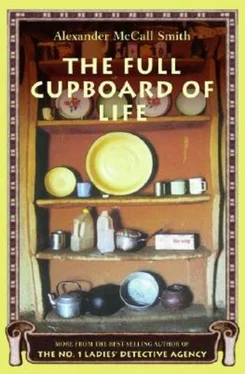Alexander Smith - The Full Cupboard of Life
Здесь есть возможность читать онлайн «Alexander Smith - The Full Cupboard of Life» весь текст электронной книги совершенно бесплатно (целиком полную версию без сокращений). В некоторых случаях можно слушать аудио, скачать через торрент в формате fb2 и присутствует краткое содержание. Жанр: Триллер, на английском языке. Описание произведения, (предисловие) а так же отзывы посетителей доступны на портале библиотеки ЛибКат.
- Название:The Full Cupboard of Life
- Автор:
- Жанр:
- Год:неизвестен
- ISBN:нет данных
- Рейтинг книги:4 / 5. Голосов: 1
-
Избранное:Добавить в избранное
- Отзывы:
-
Ваша оценка:
- 80
- 1
- 2
- 3
- 4
- 5
The Full Cupboard of Life: краткое содержание, описание и аннотация
Предлагаем к чтению аннотацию, описание, краткое содержание или предисловие (зависит от того, что написал сам автор книги «The Full Cupboard of Life»). Если вы не нашли необходимую информацию о книге — напишите в комментариях, мы постараемся отыскать её.
The Full Cupboard of Life — читать онлайн бесплатно полную книгу (весь текст) целиком
Ниже представлен текст книги, разбитый по страницам. Система сохранения места последней прочитанной страницы, позволяет с удобством читать онлайн бесплатно книгу «The Full Cupboard of Life», без необходимости каждый раз заново искать на чём Вы остановились. Поставьте закладку, и сможете в любой момент перейти на страницу, на которой закончили чтение.
Интервал:
Закладка:
Nothing more was said. The apprentices returned to their work and Mma Makutsi sat at her desk and smiled. It was a wicked thing to have done, but she could not resist it. After all, one could not be good all the time, and occasional fun at the expense of another was harmless. She had told no lies, strictly speaking; she had seen a man walking away from the garage, but she had recognised him as one who did occasionally take a shortcut that way. The real sender of the letter was obviously some young girl who had been dared to write it by her friends. It was a piece of adolescent nonsense which everybody would soon forget about. And perhaps the boys had been taught some sort of lesson, about vanity certainly, but also, in an indirect way, about tolerance of the feelings of others, who might be a bit different from oneself. She doubted if they had learned the latter lesson, but it was there, she thought, visible if one bothered to think hard enough about it.
CHAPTER FOURTEEN
MMA RAMOTSWE surveyed the House of Hope. It was a rather grand name for a modest bungalow which had been built in the early seventies, at a time when Gaborone was a small town, inching out from the cluster of buildings around Government Headquarters and the small square of shops nearby. These houses had been built for government employees or for expatriates who came to the country on short-term contracts. They were comfortable, and were large by the standards of most people’s houses, but it seemed ambitious to use them for institutions, such as the House of Hope. But there was no choice, she imagined: larger buildings simply were not available, least of all to charities, which would have to scrimp and save to meet their costs.
There was a large garden, though, and this had been well-tended. In addition to a stand of healthy-looking paw-paw trees at the back, there were several clusters of bougainvillea and a mopipi tree. A vegetable garden, rather like the vegetable garden which Mr J.L.B. Matekoni had established in Mma Ramotswe’s own yard, appeared to be growing beans and carrots with some success, although Mma Ramotswe reflected that in the case of carrots one could never really tell until one pulled them out of the ground. There were all sorts of insects which competed with us for carrots, and often what appeared from above to be a healthy plant would reveal itself as riddled with holes once pulled out of the soil.
There was a verandah to the side of the house, and somebody had thoughtfully placed shade netting over the side of this. That would be a good place to sit, thought Mma Ramotswe, and one might even drink tea there, on a hot afternoon, and feel the sun on one’s face, but filtered by the shade netting. And then the thought occurred to her that all of Gaborone, the whole town, might be covered with shade netting, held aloft on great poles, and that this would keep the town cool and hold in the water which people put on their plants. It would be comfortable under this shade netting in summer, and then when winter came, and the air was cooler, they could roll back the shade netting to let in the winter sun, which would warm them, like the smile of an old friend. It was such a good idea, and it would surely not be too expensive for a country that had all those diamonds, but she knew that nobody would ever take it seriously. So they would continue to complain about the hot weather when it was hot and about the cold weather when it was cold.
The front door of the House of Hope opened immediately into the living room. This was a large room for that style of house, but the immediate and overwhelming impression it gave Mma Ramotswe was one of clutter. There were three or four chairs in the centre of the room-tightly arranged in a circle-and around them there were tables, storage boxes, and, here and there, a suitcase. On the wall, fixed with drawing pins, were pictures ripped from magazines; pictures of families and of mothers and children; of Mother Teresa with her characteristic headscarf; of Nelson Mandela waving to a crowd; and of a line of African nuns, all clad in white, walking down a path through thick undergrowth, their hands joined in prayer. Mma Ramotswe’s eye dwelt on the picture of the nuns. Where was the photograph taken, and where were these ladies going? They looked so peaceful, she thought, that perhaps it did not matter whether they were going anywhere, or nowhere in particular. People sometimes walked simply because walking was an enjoyable thing to do, and better than standing still, perhaps, if that was all you otherwise had to do. Sometimes she herself walked around her garden for no reason, and found it very relaxing, as perhaps it was for those nuns.
“You are interested in the pictures,” said Mr Bobologo, behind her. “We think that it is important that these bar girls should be reminded of a better life. They can sit here and look at the pictures.”
Mma Ramotswe nodded. She was not convinced that it would be much fun for a bar girl, or for anybody else for that matter, to be sitting on one of those chairs in that crowded room, looking at these pictures from the magazines. But then it would be better than listening to Mr Bobologo, she thought.
Mr Bobologo now came to Mma Ramotswe’s side and pointed in the direction of the corridor that led off the living room. “I will be happy to show you the dormitories,” he said. “We may find some of the bad girls in their rooms.”
Mma Ramotswe raised an eyebrow. It was not very tactful of him to call them bad girls, even if they were. People rose to the descriptions of themselves, and it might have been better, she thought, to call them young ladies, in the hope that they might behave as young ladies behaved. But then, to be realistic, they probably would not behave that way, as it took a great deal to change somebody’s ways.
The corridor was tidy enough, with only a small bookcase along one wall and the floor well-polished with that fresh-smelling polish that Mma Ramotswe’s maid, Rose, so liked to use. They stopped outside a half-open bedroom door and Mr Bobologo knocked upon this before he pushed it open.
Mma Ramotswe looked inside. There were two bunk-beds in the room, both of them triple-deckers. The top bed was just below the ceiling, barely allowing enough space for anybody to fit in. Mma Ramotswe reflected that she herself would never fit in that space, but then these girls were younger, and some of them might be quite small.
There were three girls in the room, two lying fully clothed on the lower bunks and one wearing a dressing gown, and sitting on a middle bunk, her legs hanging down over the edge. As Mr Bobologo and Mma Ramotswe entered the room, they stared at them, not with any great interest, but with a rather vacant look.
“This lady is a visitor,” Mr Bobologo announced, somewhat obviously, thought Mma Ramotswe.
One of the girls muttered something, which may have been a greeting but which was difficult to make out. The other one on the lower bunk nodded her head, while the girl sitting on the middle bunk managed a weak smile.
“You have a nice house here,” said Mma Ramotswe. “Are you happy?”
The girls exchanged glances.
“Yes,” said Mr Bobologo. “They are very happy.”
Mma Ramotswe watched the girls, who did not appear inclined to contradict Mr Bobologo.
“And do you get good food here, ladies?” she asked.
“Very good food,” said Mr Bobologo. “These good-time bar girls do not eat properly. They just drink dangerous liquor. When they are here they are given good, Botswana cooking. The food is very healthy.”
“It is good to hear you telling me all this,” Mma Ramotswe said, pointedly addressing her remark to the girls.
“That is all right,” said Mr Bobologo. “We are happy to talk to visitors.” He touched Mma Ramotswe’s elbow and pointed out into the corridor. “I must show you the kitchen,” he said. “And we must allow these girls to get on with their work.”
Читать дальшеИнтервал:
Закладка:
Похожие книги на «The Full Cupboard of Life»
Представляем Вашему вниманию похожие книги на «The Full Cupboard of Life» списком для выбора. Мы отобрали схожую по названию и смыслу литературу в надежде предоставить читателям больше вариантов отыскать новые, интересные, ещё непрочитанные произведения.
Обсуждение, отзывы о книге «The Full Cupboard of Life» и просто собственные мнения читателей. Оставьте ваши комментарии, напишите, что Вы думаете о произведении, его смысле или главных героях. Укажите что конкретно понравилось, а что нет, и почему Вы так считаете.












